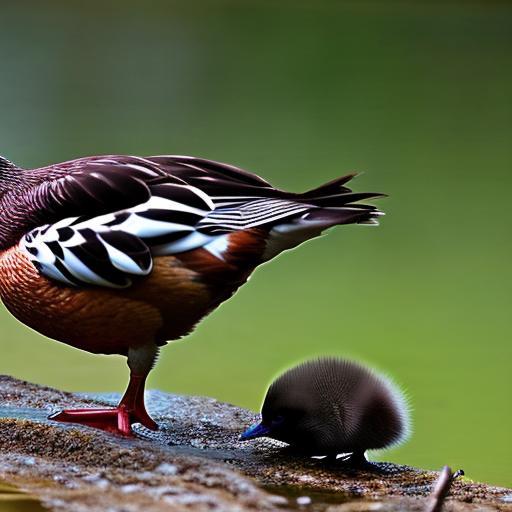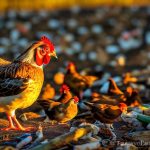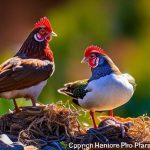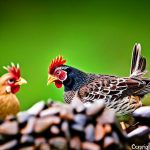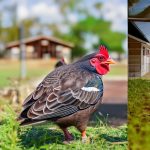Raising poultry is a rewarding and fulfilling endeavor that has been practiced for centuries. Whether you are a beginner or an experienced farmer, understanding the basics of raising poultry is essential for success. Poultry refers to domesticated birds that are raised for their meat, eggs, or feathers. The most common types of poultry are chickens, ducks, and turkeys.
Raising poultry provides numerous benefits, including a sustainable source of food, pest control, and increased biodiversity. However, it is important to have a solid understanding of the basics before embarking on this venture. This article will explore the benefits of raising chickens, ducks, and turkeys together, factors to consider before keeping them together, housing requirements, feeding and nutrition needs, health concerns, social dynamics, tips for managing a mixed flock, and common problems to watch out for.
Key Takeaways
- Raising poultry involves understanding the basics of their care and needs.
- Keeping chickens, ducks, and turkeys together can provide benefits such as pest control and diversity in egg production.
- Factors such as space, temperament, and dietary needs should be considered before keeping different poultry species together.
- Housing requirements for chickens, ducks, and turkeys should be tailored to their specific needs and behaviors.
- Feeding and nutrition needs vary between poultry species and should be carefully managed to ensure optimal health.
Benefits of Raising Chickens, Ducks, and Turkeys Together
One of the main benefits of raising chickens, ducks, and turkeys together is cost-effectiveness. By keeping multiple types of poultry in one flock, you can save money on housing and equipment. Additionally, each type of bird has different dietary needs, so they can help diversify your feed sources and reduce costs.
Another benefit is increased biodiversity. Having a mixed flock allows for a more diverse ecosystem on your farm. Each type of bird has unique behaviors and characteristics that contribute to the overall health and balance of the environment.
Pest control is another advantage of raising chickens, ducks, and turkeys together. Chickens are known for their ability to eat insects and pests such as ticks and fleas. Ducks are excellent at controlling slugs and snails in gardens. Turkeys also contribute to pest control by eating grasshoppers and other insects.
Mutual protection is yet another benefit of keeping these birds together. Chickens are known to be more vulnerable to predators, but when they are in a mixed flock with ducks and turkeys, they have added protection. Ducks are excellent at sounding the alarm when predators are near, and turkeys are known for their aggressive behavior towards potential threats.
Factors to Consider Before Keeping Chickens, Ducks, and Turkeys Together
Before keeping chickens, ducks, and turkeys together, there are several factors to consider. First and foremost, it is important to check local regulations and zoning laws regarding the keeping of poultry. Some areas may have restrictions on the number of birds you can keep or specific requirements for housing and sanitation.
Space requirements are another important consideration. Each type of bird has different space requirements, so it is important to ensure that you have enough room to accommodate all of them comfortably. Chickens generally require 4 square feet per bird in the coop and 10 square feet per bird in the run. Ducks need more space, with 10 square feet per bird in the coop and 20 square feet per bird in the run. Turkeys require even more space, with 15 square feet per bird in the coop and 30 square feet per bird in the run.
Compatibility of breeds is another factor to consider. Some breeds of chickens, ducks, and turkeys may not get along well together. It is important to choose breeds that have similar temperaments and size to ensure harmony within the flock.
Predators in the area should also be taken into consideration. Chickens are particularly vulnerable to predators such as raccoons, foxes, and hawks. Ducks are susceptible to attacks from raccoons and minks. Turkeys are larger and more aggressive, but they can still fall victim to predators if not properly protected.
Housing Requirements for Chickens, Ducks, and Turkeys
Proper housing is essential for the health and well-being of your poultry flock. When keeping chickens, ducks, and turkeys together, it is important to design a coop and run that can accommodate all three types of birds.
The coop should be well-ventilated and provide protection from the elements. It should also have nesting boxes for the hens to lay their eggs. The general rule of thumb is to have one nesting box for every four to five hens. The boxes should be filled with clean straw or shavings to provide a comfortable and safe environment for egg-laying.
Roosting bars are also important for chickens, ducks, and turkeys. These bars should be placed at different heights to accommodate the different sizes of the birds. Chickens prefer to roost higher up, while ducks and turkeys prefer lower roosts.
Water and food stations should be easily accessible to all birds. It is important to provide fresh water daily and ensure that it is clean and free from contaminants. Each type of bird has different dietary needs, so it is important to provide appropriate feed for each species.
Feeding and Nutrition Needs of Chickens, Ducks, and Turkeys
Chickens, ducks, and turkeys have different dietary needs, so it is important to provide them with appropriate feed. Chickens are omnivores and require a balanced diet of grains, protein, vitamins, and minerals. They can be fed a commercial poultry feed or a homemade mix of grains, seeds, and vegetables.
Ducks are also omnivores but have a higher protein requirement than chickens. They require a diet that includes both plant matter and animal protein. Ducks can be fed a commercial duck feed or a mix of grains, seeds, vegetables, insects, and small fish.
Turkeys are primarily herbivores but will also eat insects and small animals. They require a high-protein diet to support their rapid growth. Turkeys can be fed a commercial turkey feed or a mix of grains, seeds, vegetables, and insects.
Feeding schedules should be consistent and regular. It is important to provide fresh feed daily and ensure that it is stored in a cool, dry place to prevent spoilage. Supplemental nutrition may be necessary, especially during periods of high egg production or growth.
Health Concerns When Raising Chickens, Ducks, and Turkeys Together

When raising chickens, ducks, and turkeys together, it is important to be aware of common health concerns that can affect these birds. Some of the most common diseases include avian influenza, Newcastle disease, coccidiosis, and Marek’s disease.
Parasites such as mites, lice, and worms can also affect poultry. Regular monitoring and treatment are essential to prevent infestations and keep your flock healthy.
Biosecurity measures should be implemented to prevent the spread of diseases. This includes keeping the coop clean and sanitized, quarantining new birds before introducing them to the flock, and limiting contact with other poultry farms or wild birds.
Social Dynamics of Chickens, Ducks, and Turkeys in a Mixed Flock
Chickens, ducks, and turkeys have different social dynamics within a mixed flock. Chickens have a well-established pecking order, with one dominant bird at the top of the hierarchy. Ducks also have a pecking order but tend to be more social and less aggressive than chickens. Turkeys have a complex social structure with multiple dominant birds.
Understanding these social dynamics is important for managing a mixed flock. It is important to provide enough space for each bird to establish their own territory and avoid overcrowding. Providing multiple feeding and watering stations can also help reduce competition and aggression within the flock.
Mating behaviors can also vary between chickens, ducks, and turkeys. Chickens mate through a process called “treading,” where the rooster mounts the hen. Ducks mate through forced copulation, where the drake forcefully mounts the female. Turkeys have a more elaborate courtship display, with the male puffing up his feathers and fanning his tail to attract a mate.
Tips for Managing a Mixed Flock of Chickens, Ducks, and Turkeys
Managing a mixed flock of chickens, ducks, and turkeys requires careful attention and observation. Here are some tips to help you successfully manage your flock:
1. Provide adequate space: Each type of bird has different space requirements, so it is important to provide enough room for each bird to establish their own territory and avoid overcrowding.
2. Monitor behavior: Regularly observe the behavior of your birds to ensure that they are getting along and there are no signs of aggression or bullying. If you notice any aggressive behavior, it may be necessary to separate the birds or provide additional space.
3. Separate aggressive birds: If you have a particularly aggressive bird that is causing problems within the flock, it may be necessary to separate them from the rest of the birds. This can help reduce stress and prevent injuries.
4. Provide enrichment activities: Chickens, ducks, and turkeys all benefit from enrichment activities such as dust bathing areas, perches, and toys. These activities help keep the birds mentally stimulated and reduce boredom.
Common Problems to Watch Out for When Keeping Poultry Together
When keeping chickens, ducks, and turkeys together, there are several common problems to watch out for. Disease outbreaks can quickly spread through a flock if proper biosecurity measures are not in place. It is important to monitor your birds regularly for signs of illness and seek veterinary care if necessary.
Aggressive behavior can also be a problem in a mixed flock. Chickens can be particularly aggressive towards smaller birds such as ducks or turkeys. It is important to monitor the behavior of your birds and separate any aggressive individuals if necessary.
Egg-eating is another common problem that can occur in a mixed flock. Chickens, ducks, and turkeys may develop a habit of eating their own eggs, which can be difficult to break. Providing enough nesting boxes and collecting eggs regularly can help prevent this behavior.
Is Keeping Chickens, Ducks, and Turkeys Together Right for You?
Keeping chickens, ducks, and turkeys together can be a rewarding and enjoyable experience. It offers numerous benefits such as cost-effectiveness, increased biodiversity, pest control, and mutual protection. However, it is important to consider factors such as local regulations, space requirements, compatibility of breeds, and predators in the area before keeping them together.
Proper housing, feeding, and health care are essential for the well-being of your mixed flock. Understanding the social dynamics and implementing management strategies can help ensure a harmonious and successful flock.
If you are considering keeping chickens, ducks, and turkeys together, it is important to do further research and seek advice from experienced poultry farmers. With proper planning and care, raising a mixed flock can be a rewarding and fulfilling experience that provides you with a sustainable source of food and a deeper connection to the natural world.
If you’re considering keeping chickens, ducks, and turkeys together, it’s important to understand the dynamics and requirements of each species. While they can coexist in the same space, there are certain considerations to keep in mind. One helpful resource is an article on Poultry Wizard that provides insights into the topic. This article discusses the compatibility of these birds and offers tips on how to successfully house them together. To learn more about this topic, check out the article here. Additionally, if you’re interested in creating a comfortable and functional coop for your chickens, another informative article on Poultry Wizard offers creative interior ideas for chicken coops. You can find it here.
FAQs
What are the benefits of keeping chickens, ducks, and turkeys together?
Keeping chickens, ducks, and turkeys together can provide a variety of benefits, including pest control, efficient use of space, and increased biodiversity in your backyard.
Is it safe to keep chickens, ducks, and turkeys together?
Yes, it is generally safe to keep chickens, ducks, and turkeys together as long as they are provided with adequate space, food, and water. However, it is important to monitor their behavior and health regularly to ensure that they are not experiencing any issues.
What are the potential problems of keeping chickens, ducks, and turkeys together?
Some potential problems of keeping chickens, ducks, and turkeys together include disease transmission, aggression between different species, and differences in dietary needs. It is important to research and understand the specific needs of each species before attempting to keep them together.
What should I consider before keeping chickens, ducks, and turkeys together?
Before keeping chickens, ducks, and turkeys together, you should consider the space requirements for each species, their dietary needs, and their compatibility with each other. It is also important to research any local regulations or zoning laws that may apply to backyard poultry keeping.
What are some tips for keeping chickens, ducks, and turkeys together?
Some tips for keeping chickens, ducks, and turkeys together include providing plenty of space, ensuring that each species has access to appropriate food and water sources, and monitoring their behavior and health regularly. It is also important to provide shelter and protection from predators.
Meet Walter, the feathered-friend fanatic of Florida! Nestled in the sunshine state, Walter struts through life with his feathered companions, clucking his way to happiness. With a coop that’s fancier than a five-star hotel, he’s the Don Juan of the chicken world. When he’s not teaching his hens to do the cha-cha, you’ll find him in a heated debate with his prized rooster, Sir Clucks-a-Lot. Walter’s poultry passion is no yolk; he’s the sunny-side-up guy you never knew you needed in your flock of friends!

